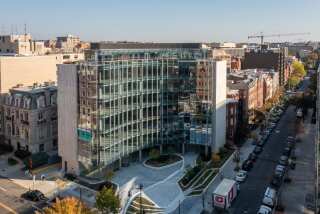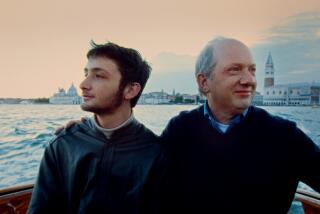Schonberg Center Plans Opening Festivities
Vienna’s Arnold Schonberg Center--new headquarters for the Arnold Schoenberg Institute, which made its home at USC for 14 years--will celebrate its opening with nine days of ceremonies, receptions and concerts of music by the 20th century composer and his disciples beginning March 11.
The opening of the new center will mark the end of the partnership between USC and Schoenberg’s heirs, which crumbled last year after a long legal battle over appropriate use of the institute building and resulted in the family’s decision to pull the massive collection of memorabilia and manuscripts from the campus.
Along with bringing the collection to Schoenberg’s birthplace, the new center is readopting the original spelling of the family name, Schonberg. The Jewish composer traded the umlaut for an E after his flight from Europe to Los Angeles in 1934 to escape Nazi persecution.
While the Schoenberg Institute at USC has been housed in its own modern two-story building, the Vienna facility, funded by the governments of Vienna and Austria, will occupy one floor of the existing Palais Fanto, built in 1917 and completely renovated in 1994. The building’s marble staircases lead up to the center’s modern space on the second floor, designed by architect Elsa Prochazka.
The start-up cost for the nonprofit Vienna facility is $3 million; the center will have a $1.5-million annual budget. USC budgeted $300,000 annually for maintaining the collection, which along with original scores, papers and manuscripts includes a full-sized replica of the study in the Brentwood home Schoenberg occupied until his death in 1951, chess pieces and game boards designed by the composer, and books bound in ornate fabrics he made himself.
The Palais Fanto center will approximately double the space of the USC institute, and plans to add paintings and drawings by the composer to the displays. Its 16,000 square feet includes 3,500 square feet of exhibition space, and, like the USC center, a 200-seat concert hall, temperature-controlled archives and an administration area.
The Vienna facility also includes rooms for the chair of Schoenberg research of the Vienna Music Academy. The staff of five--director, assistant director, two archivists and a secretary--is about the same size as USC’s. Christian Meyer, 34, former marketing director of the Vienna Konzerthaus, was named director of the new center in April. Camille Crittenden, an assistant archivist at the institute in L.A., is moving to Austria to join the center staff, and archivist Therese Muxender has been in residence at USC for the past few months in preparation for taking over care of the collection in Vienna.
Schonberg Center’s grand opening events, during the second week in March, include performances by the Vienna Philharmonic, conducted by Zubin Mehta, the Hagen Quartet and a song recital from soprano Angelika Kirchschlager. The formal opening is scheduled for March 15.
The bulk of the Schoenberg Institute’s holdings, donated to USC by the family in 1973, will be relocated before the March opening, but the USC facility will remain in existence until the end of 1998 to allow time for all items to be transferred. The archives and exhibits have been closed since August, but scholars and researchers still have access to electronic databases.
In the meantime, the upper floor of the USC building will continue to be used for student recitals, concerts and general music courses by the music school. Future uses of the building have not yet been determined, a music school spokeswoman said.
The content of those classes and concerts was a major sticking point in the dispute between the Schoenbergs and USC, with the Schoenbergs saying all performances and classes should relate directly to the 20th century composer’s work. The music school was lobbying for broader use.
The family decided to find a new home for the collection rather than acquiesce, and accepted an offer from the governments of Vienna and Austria to house and maintain the collection.
“My Uncle Larry [Lawrence Schoenberg, the composer’s youngest son] was saying it’s very emotional, packing up everything,” Randol Schoenberg said last week. “It didn’t end well, but USC really did a lot for [14] years.”
More to Read
The biggest entertainment stories
Get our big stories about Hollywood, film, television, music, arts, culture and more right in your inbox as soon as they publish.
You may occasionally receive promotional content from the Los Angeles Times.










